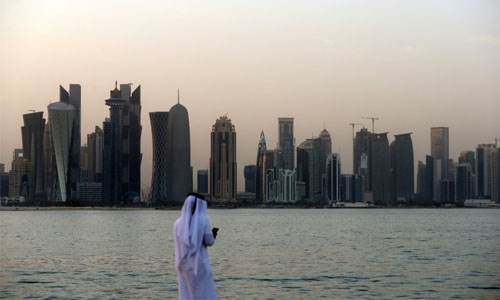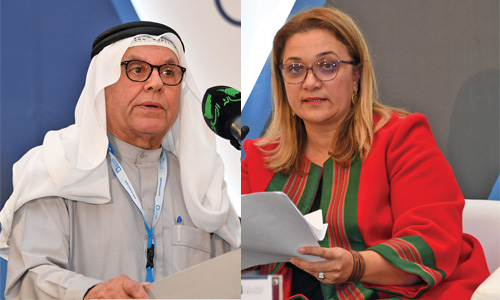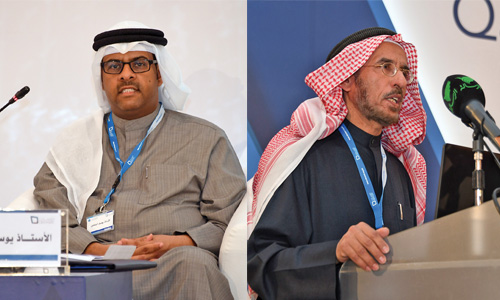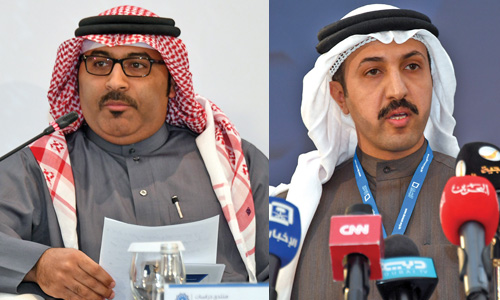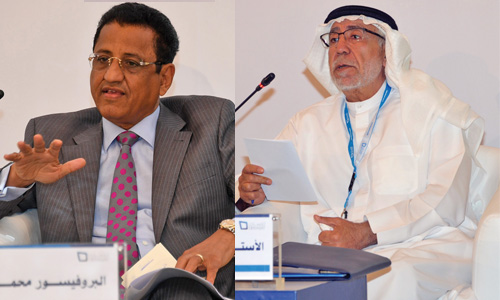Qatar: the patron of anarchy and crisis
Manama : Qatar has been the main sponsor of chaos and promoter of terrorism in the region during the past few decades, politicians and experts said during a key seminar yesterday.
Former Arab ministers, chief editors of local dailies in Bahrain and GCC states, researchers and political experts all spoke with one voice during the event proving Qatar’s involvement in countless attempts aimed at destroying many Arab nations, including Bahrain and its GCC neighbours, Egypt, the Arabian Levant and North African countries.
They were speaking during a seminar titled “Qatar: Patron of anarchy and crisis in the Middle East”. The seminar is the first of a series of similar discussions to be held by the Bahrain Centre for Strategic, International and Energy Studies (Derasat), a Bahrain-based centre for research, studies and dialogue.
“Qatar is a constant crisis in the Middle East,” said Derasat Chairman Dr Shaikh Abdulla bin Ahmed Al Khalifa in his opening address at the seminar.
The kingdom, Dr Shaikh Abdulla said, has utilised its financial and media resources to threaten the security of the GCC and made countless attempts to create the the biggest damage possible to the region.
“Doha placed itself as a tool of chaos and division projects in the region,” he said adding: “Bahrain, over the past period, was able to reveal new evidence revealing Qatari support to terrorist organisations.”
This, Dr Shaikh Abdulla said, came as Qatar lagged behind in political progress and democratic developments.
The official stressed: “There will be no compromise in battling extremism and terrorism”.
“Bahrain will continue its march to accomplish more development and reforms following the reform project of HM the King,” he stressed.
History of Hostility
The first session titled “Qatari threats to the Kingdom of Bahrain: past and present” focused on the history of the Qatari hostility against Bahrain.
It was chaired by Bahraini Political Affairs Researcher and Columnist Dr Mohammed Juma.
The speakers in the session were Akhbar Al Khaleej Newspaper Editor-in-Chief Anwar Abdulrahman, Al Watan Newspaper Editor-in-Chief Yousif Albinkhalil and University of Bahrain’s Bahrain Studies Centre Director Dr Mohammed Ahmed Abdulla.
Launching the talks, Dr Juma said, “Qatar has been a dagger in the body of the GCC since two decades with its continuous attempts to destabilise the region.”
He highlighted Qatari attempts to acquire Bahraini lands throughout the years and blasted it for utilising media to target and defame GCC countries, especially Bahrain and its democratic efforts and reforms.
Heritage of treason
Anwar Abdulrahman, in his speech, drew a detailed picture of the regime’s history of treason and how their rulers were deposed by their sons.
Explaining the sequence of the power struggle in the kingdom, before the current ruler’s father suspiciously stepped down of the throne for his son in 2013, Abdulrahman said: “The last legal ruler of Qatar was Shaikh Ahmed bin Ali Al Thani. He was deposed on February 22, 1972, by Shaikh Khalifa bin Hamad Al Thani, the grandfather of the current ruler. This happened while Shaikh Ahmed was on a hunting trip in Iran, where the Iranian Shah had offered to occupy Qatar and restore his rule, but Shaikh Ahmed rejected the offer to prevent any bloodshed. Shaikh Khalifa was overthrown by his own son on June 27, 1997.”
Abdulrahman also narrated his experience of witnessing the international trial that took place in the year 2000 ahead of the issuance of the final verdict in the Bahraini-Qatari dispute over Hawar islands. He described the day as “one of the most important chapters in the history of Bahrain”.
He said: “The Qatari government attempted to bluff 15 judges at the highest court in the world by stating that Bahrain wasn’t an archipelago.”
“All the documents presented by Qatar were proven to be forged and counterfeit.
“This was confirmed when the Qatari attorneys were exposed while presenting ottoman documents that they had purchased from a Dutch toy store.
“These fake documents destroyed the Qatari cause and allegations and the final verdict was for Bahrain.”
“If they had no hesitation to bluff the international court, do you think they will not take the same attempts again and again,” Abdulrahman stressed adding: “The case was a legal suicide for Qatar.”
Seven methods of interference
Yousif Albinkhalil revealed how the Qatari regime followed seven methods to interfere in the affairs of Bahrain. These methods, he said, adopted political, military, financial and intelligence interferences.
“In June 2010, eight months ahead of the chaotic events in Bahrain in 2011, Qatar has formed a special committee to evaluate the Bahraini-Qatari relations. The committee recommended supporting radical organisations in Bahrain, infiltrate the Bahraini State and gain more supporters for the Qatari Government here. This explained the Qatari role in Bahrain and its interferences in the Kingdom. The current boycott revealed many of the Qatari conspiracies targeting Bahrain and fellow GCC countries,” Albinkhalil stressed.
Explaining further, he said, “There are seven main interferences of the Qatari Regime in Bahrain.” “This included spying on Bahrain, political naturalising of Bahraini citizens, utilising media to target the country, military hostility, political interference, supporting international organisations against Bahrain and partnership with Iran against the interests of Bahrain and the region.”
He further pointed out that four Qatari spying cells were detected in Bahrain, since the 1980s. “They were spying on the Bahraini military locations, capabilities and intelligence.”
Qatar, Albinkhalil said, has also utilised Al Jazeera News Network to target Bahrain and published more than 900 content against the state. “This is motivated by political intentions and is in addition to four negative documentaries aired to defame the government here and incite the people of Bahrain against their leaders.”
He said Qatar set aside 16 newspapers and channels to publish negative and seditious content against Bahrain.
Explaining further, he told the session that Qatari government played a dangerous game against Bahrain called “political naturalisation”. “It aimed at emptying Bahrain of Arabian families by offering them Qatari citizenship and other privileges and also focused on naturalising leading military personnel.
Allying with Iran is another face of these interferences, he told the session. “Qatari regime acknowledged Iranian interferences in Bahrain since the 1970s.”
He pointed out that Qatar had the intention to support the Iranian branches and radical cells in the Kingdom. “Additionally, the Iranian ambassador in Doha facilitated this campaign against Bahrain, as he was managing the newsroom in Al Jazeera.”
Al Binkhalil also shed light on the military interferences. “Seven Qatari military interferences were reported in Bahrain, such as the occupation of Bahraini islands in 1986, frequently entering territorial Bahraini waters and other events”.
On the Political front, he highlighted Qatar’s relations with radical organisations in Bahrain since the 1990s. “They granted Qatari citizenship to Bahraini radical individuals to facilitate their movement in the GCC and the world,” he stressed.
“Many so-called research centres were established in Doha, which was used for intelligence and spying purposes or played hosts to wanted terrorists in Bahrain. “They were either supported or naturalised to empower them and facilitate their destructive ideologies and extremist activities,” Al Binkhalil said.
The final speaker in the session was Dr Mohammed Ahmed Abdulla, who shed light on the history of the Qatari peninsula and how it was considered as “lands within Bahrain territory”.
Speaking about the hostile policies adopted by Qatar throughout the years, he said: “The events recorded in the past three decades against Bahrain indicates a need for a change in the hostile Qatari regime.”
Dr Abdula highlighted the history of the Al Khalifa family in the region and their rule in the Qatari peninsula since the 18thcentury, explaining how “the Al Thani family allied with the Ottomans to rule the country”.
“The Al Khalifa ruled the entire Qatari peninsula in 1762-1871” stressing that “it’s important to review the history according to local records and not only to what the occupants documented”.
Terror-backing policies
In the second and third sessions of the seminar, experts from Arab states underlined some of the dangerous terror-backing Qatari policies in their countries.
The second session featured Former Egyptian Foreign Affairs Minister and House of Representatives Arab Affairs Committee Member Ambassador Ahmed Al Orabi, Former Yemeni Information Minister Professor Mohammed Al Qubaty, Supreme Council of Libyan Tribes and Cities President Dr Al Ageli Breni and the only female speaker in the seminar Tunisian Representatives Assembly Member Leila Chettaoui.
It was themed “Examples of Qatari involvement in destabilisation”.
“Gulf security and future scenarios of Qatari hostile policy” was the title of the third and final session of the day.
It was chaired by Derasat Chairman Dr Shaikh Abdulla bin Ahmed Al Khalifa. Speaking in the session were Emirates Journalists Association President Mohammed Yousif, Okaz Newspaper (Saudi Arabia) Editor-in-Chief Jameel Al Theyabi, Watani Al Emarat Foundation General Manager Dherar Al Falasi and Former Asharq Al Awsat Newspaper Editor-in-Chief Salman Al Dossary.
Key outcomes
•Bahrain suffered from Qatari interventions on more than one level and this reached the level of military aggression in Fasht Al-Dibil in 1986.
•Qatar’s falsification of historical documents also lead to systematic looting of Bahrain’s wealth.
•Qatar used naturalisation of Bahraini citizens as a tool to implement their subversive agenda and to harm national security.
•Qatar, despite being offered many opportunities by Bahrain, Saudi Arabia, the United Arab Emirates and Egypt, continued to support, sponsor and finance terrorist groups and provide safe havens for them.
•The current crisis with Qatar is not only a GCC conflict, but is also with many Arab and Islamic countries.
•Qatari regime has consistently broken commitments and failed to honour them, which includes failing to honour the 2013 Riyadh Agreement, the Supplementary Agreement and its 2014 operational mechanisms.
Recommendations
•Qatar should immediately cease supporting and financing terrorism and should stop being a tool of Iran’s expansionist agenda.
•Qatari government should cease all hostilities against Bahrain including support to terrorism, media incitement, as well as political naturalisation.
•Provide appropriate compensation for the damage caused to innocent lives, infrastructure and others in the Kingdom.
•Qatar should commit to the six principles emanating from the 13 demands and the Riyadh Agreement of 2014, if it has to initiate a dialogue
•The International community should take serious action against the dangerous role played by Qatar to destabilise security and stability, leading to the aggravation of terrorism worldwide.
Related Posts

